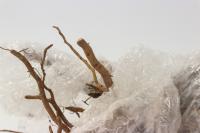1、 Curing method
1. Substrate selection: Sedum can grow well in loose and well drained soil. We can mix rotten leaf soil, garden soil and some clean river sand
2. Light management: place the plants in a ventilated and shady place in summer and in direct sunlight in spring and autumn. In winter, it should be placed in a bright place indoors and supplied with light all year round
3. Nutrient management: the growth speed is fast, and excessive fertilization is not allowed. Otherwise, too lush Sedum will affect the tree shape and the beauty of plants. In the growing season, it is good to use thin fertilizer and water twice. Fertilization is prohibited in winter
4. Water management: it has strong drought tolerance and can grow under drought conditions. But its roots are afraid of blisters. If there is water, it will lead to rotten roots. The principle of watering it is not to water when the soil is not dry, and the soil must be watered thoroughly when watering
2、 Breeding skills
1. Winter: it should be moved to a well lit place in winter. Wrapping it with plastic film outdoors can achieve the purpose of thermal insulation. Open the plastic film every two days at noon, which is conducive to the growth of plants
2, summer: put it in a cool place, shade it, and spray it properly, 2~3 times a day. p>
3、 Problem diagnosis and treatment
1. Rotten roots: if you water too much at ordinary times, ponding will endanger its root growth. You must control the number and amount of watering
2. Leaf spot disease: if leaf spot disease is found, the diseased leaves can be removed to prevent infecting other leaves. If it is serious, 70% methyltobuzin can be sprayed for control
4、 Other issues
1. Whether it can be raised at home: it can be raised at home, which can be pleasing to the eyes, purify the air and absorb harmful substances
2. Whether it can be planted: it can be planted on the ground. I like a warm, dry and relatively warm environment. Because plants don't like cold, but they must be prepared for cold in winter to avoid frostbite

 jackfruit
jackfruit snake plant
snake plant hibiscus
hibiscus hydrangea
hydrangea lavender
lavender Green roses climb al...
Green roses climb al... If you don't pay att...
If you don't pay att... Management of four g...
Management of four g...

































